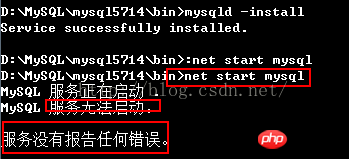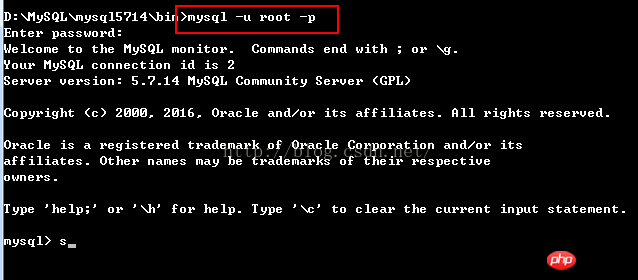Example method of installing the decompressed version of mysql5.7.14
There are two ways to install
MySQL, one is in msi format and the other is in zip format. This article mainly introduces the installation graphic tutorial of the decompressed version of mysql5.7.14. Friends who need it can refer to MySQL is divided into Community Edition (Community Server) and Enterprise Edition (Enterprise). Their differences are: The community version can be freely downloaded and is free, but the official does not provide technical support and is suitable for ordinary users; the enterprise version is paid and cannot be downloaded online. It provides more functions and more complete technical support.
There are two ways to install MySQL, one is in msi format and the other is in zip format. The MySQL installation method in msi format is a fool-proof installation, which will not be described in this article. After the zip package is decompressed, MySQL can be used, but it needs to be configured before use.
1. Unzip the file to your own installation path. My installation path is: D:\MySQL:
 2. After completing the above decompression, you need Configure environment
2. After completing the above decompression, you need Configure environment
->Advanced->Environment Variables->System Environment Variables->path Add the path to the bin folder in the installation directory to path, as shown below
 3. After that we need to modify the
3. After that we need to modify the
, find the my-default.ini file in the installation directory, modify the two quantities basedir and datadir in it, as shown below:

basedir = D:\MySQL\mysql5714 datadir = D:\MySQL\mysql5714\data
After modification, this file can be saved as my.ini
4. Then run cmd as an administrator to enter the command line window, and enter the bin folder under the MySQL installation path:
 Run the mysql -install command below:
Run the mysql -install command below:
 If the installation is successful, you will be prompted.
If the installation is successful, you will be prompted.
5. After the installation is successful, run the net start mysql command:
 If the service cannot be started as shown in the picture above, there will be no
If the service cannot be started as shown in the picture above, there will be no
After upgrading to version 5.7, it is somewhat different from the previous version. There is no data folder. We all know that the MySQL database file is saved in data folder. Some people on the Internet said to copy the data folder of version 5.6. This is not reliable. I also tried it. I can indeed log in, but I cannot change the administrator password. Here is a standard solution.
After installing MySQL5.7, open the cmd command window and enter the bin directory in the MySQL installation directory, then enter the following command and press Enter:
mysqld --initialize-insecure --user=mysql
 After executing the above command, MySQL will create a data folder and build a default database. The logged-in user name is root and the password is empty. The subsequent operations are the same as the previous version.
After executing the above command, MySQL will create a data folder and build a default database. The logged-in user name is root and the password is empty. The subsequent operations are the same as the previous version.
6. Repeat the instructions in 5 to open the service
7. Run mysql -u root -p to enter mysql

【Related recommendations】
1.
Free mysql online video tutorialMySQL latest manual tutorialThose things about database designThe above is the detailed content of Example method of installing the decompressed version of mysql5.7.14. For more information, please follow other related articles on the PHP Chinese website!

Hot AI Tools

Undresser.AI Undress
AI-powered app for creating realistic nude photos

AI Clothes Remover
Online AI tool for removing clothes from photos.

Undress AI Tool
Undress images for free

Clothoff.io
AI clothes remover

Video Face Swap
Swap faces in any video effortlessly with our completely free AI face swap tool!

Hot Article

Hot Tools

Notepad++7.3.1
Easy-to-use and free code editor

SublimeText3 Chinese version
Chinese version, very easy to use

Zend Studio 13.0.1
Powerful PHP integrated development environment

Dreamweaver CS6
Visual web development tools

SublimeText3 Mac version
God-level code editing software (SublimeText3)

Hot Topics
 MySQL: An Introduction to the World's Most Popular Database
Apr 12, 2025 am 12:18 AM
MySQL: An Introduction to the World's Most Popular Database
Apr 12, 2025 am 12:18 AM
MySQL is an open source relational database management system, mainly used to store and retrieve data quickly and reliably. Its working principle includes client requests, query resolution, execution of queries and return results. Examples of usage include creating tables, inserting and querying data, and advanced features such as JOIN operations. Common errors involve SQL syntax, data types, and permissions, and optimization suggestions include the use of indexes, optimized queries, and partitioning of tables.
 Why Use MySQL? Benefits and Advantages
Apr 12, 2025 am 12:17 AM
Why Use MySQL? Benefits and Advantages
Apr 12, 2025 am 12:17 AM
MySQL is chosen for its performance, reliability, ease of use, and community support. 1.MySQL provides efficient data storage and retrieval functions, supporting multiple data types and advanced query operations. 2. Adopt client-server architecture and multiple storage engines to support transaction and query optimization. 3. Easy to use, supports a variety of operating systems and programming languages. 4. Have strong community support and provide rich resources and solutions.
 MySQL's Place: Databases and Programming
Apr 13, 2025 am 12:18 AM
MySQL's Place: Databases and Programming
Apr 13, 2025 am 12:18 AM
MySQL's position in databases and programming is very important. It is an open source relational database management system that is widely used in various application scenarios. 1) MySQL provides efficient data storage, organization and retrieval functions, supporting Web, mobile and enterprise-level systems. 2) It uses a client-server architecture, supports multiple storage engines and index optimization. 3) Basic usages include creating tables and inserting data, and advanced usages involve multi-table JOINs and complex queries. 4) Frequently asked questions such as SQL syntax errors and performance issues can be debugged through the EXPLAIN command and slow query log. 5) Performance optimization methods include rational use of indexes, optimized query and use of caches. Best practices include using transactions and PreparedStatemen
 How to connect to the database of apache
Apr 13, 2025 pm 01:03 PM
How to connect to the database of apache
Apr 13, 2025 pm 01:03 PM
Apache connects to a database requires the following steps: Install the database driver. Configure the web.xml file to create a connection pool. Create a JDBC data source and specify the connection settings. Use the JDBC API to access the database from Java code, including getting connections, creating statements, binding parameters, executing queries or updates, and processing results.
 How to start mysql by docker
Apr 15, 2025 pm 12:09 PM
How to start mysql by docker
Apr 15, 2025 pm 12:09 PM
The process of starting MySQL in Docker consists of the following steps: Pull the MySQL image to create and start the container, set the root user password, and map the port verification connection Create the database and the user grants all permissions to the database
 MySQL's Role: Databases in Web Applications
Apr 17, 2025 am 12:23 AM
MySQL's Role: Databases in Web Applications
Apr 17, 2025 am 12:23 AM
The main role of MySQL in web applications is to store and manage data. 1.MySQL efficiently processes user information, product catalogs, transaction records and other data. 2. Through SQL query, developers can extract information from the database to generate dynamic content. 3.MySQL works based on the client-server model to ensure acceptable query speed.
 How to install mysql in centos7
Apr 14, 2025 pm 08:30 PM
How to install mysql in centos7
Apr 14, 2025 pm 08:30 PM
The key to installing MySQL elegantly is to add the official MySQL repository. The specific steps are as follows: Download the MySQL official GPG key to prevent phishing attacks. Add MySQL repository file: rpm -Uvh https://dev.mysql.com/get/mysql80-community-release-el7-3.noarch.rpm Update yum repository cache: yum update installation MySQL: yum install mysql-server startup MySQL service: systemctl start mysqld set up booting
 Laravel Introduction Example
Apr 18, 2025 pm 12:45 PM
Laravel Introduction Example
Apr 18, 2025 pm 12:45 PM
Laravel is a PHP framework for easy building of web applications. It provides a range of powerful features including: Installation: Install the Laravel CLI globally with Composer and create applications in the project directory. Routing: Define the relationship between the URL and the handler in routes/web.php. View: Create a view in resources/views to render the application's interface. Database Integration: Provides out-of-the-box integration with databases such as MySQL and uses migration to create and modify tables. Model and Controller: The model represents the database entity and the controller processes HTTP requests.






